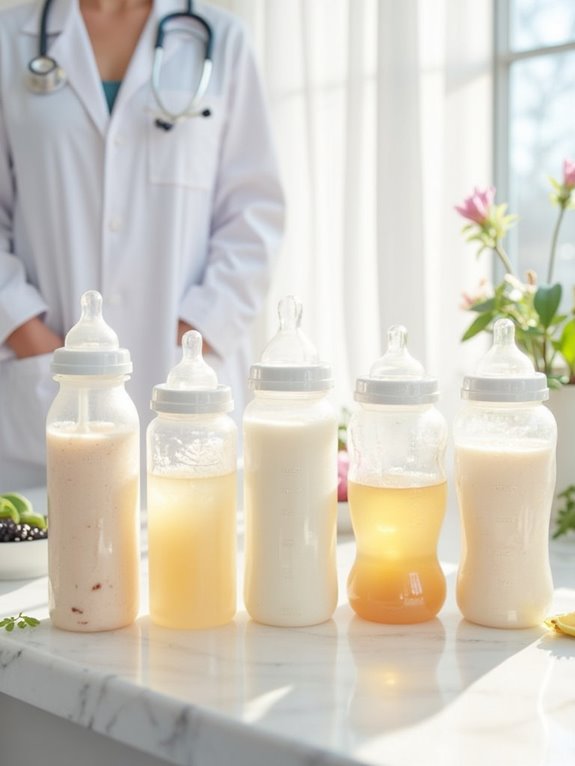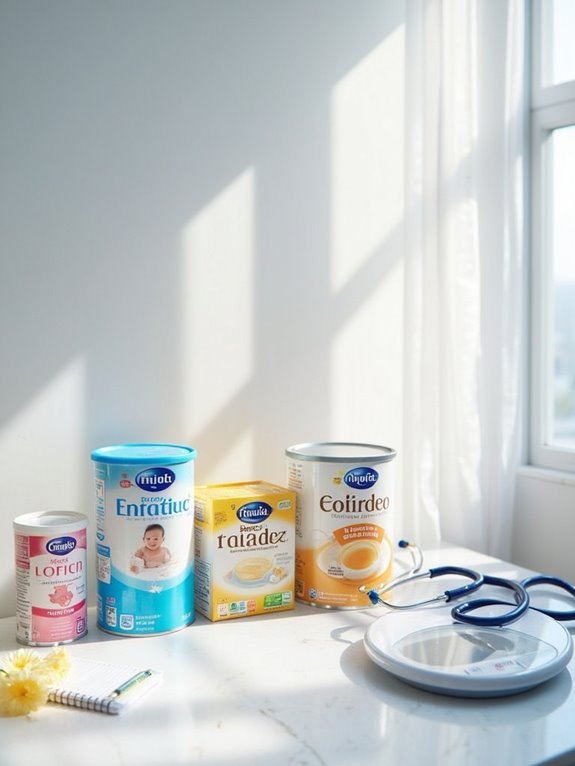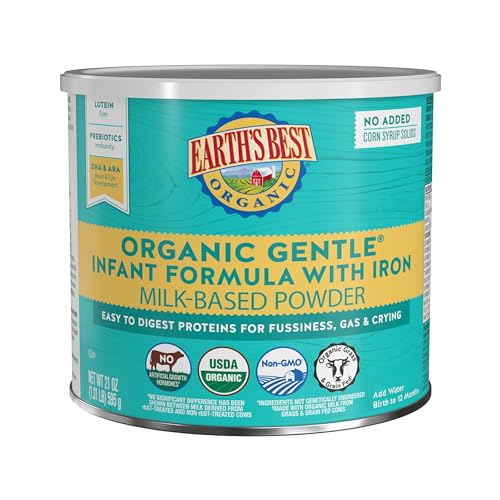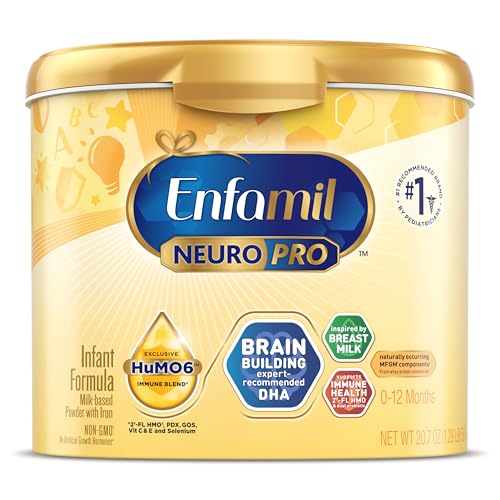As an Amazon Associate, we earn from qualifying purchases. Some links may be affiliate links at no extra cost to you. Although our opinions are based on curated research, we haven't used these products. Articles generated with AI.

5 Best Baby Formulas of 2025, According to Pediatricians
The top baby formulas for 2025 prioritize breast milk-like nutrition and gentle digestion. Enfamil Optimum Gentlease leads with dual HMOs and lactoferrin, while Similac 360 Total Care features five HMOs for immune support. Enfamil NeuroPro Ready-to-Feed includes MFGM for cognitive development, Earth’s Best Organic offers gentle whey protein, and Enfamil NeuroPro Powder provides science-backed nutrients. Understanding each formula’s unique benefits will help you make the best choice for your baby’s needs.
Key Takeaways
- Enfamil Optimum Gentlease leads with immune-supporting dual HMOs and lactoferrin, reducing fussiness within 24 hours through gentle proteins.
- Similac 360 Total Care features five breast milk-identical HMOs and convenient ready-to-feed bottles for immune and brain development.
- Enfamil NeuroPro Ready-to-Feed contains MFGM and DHA, supporting cognitive development through age 5 with easy-to-digest proteins.
- Earth’s Best Organic Gentle uses partially hydrolyzed whey protein from grass-fed cows, enriched with iron and DHA.
- Enfamil NeuroPro Powder provides pediatrician-backed MFGM components and HuMO6 immune blend for comprehensive developmental support.
Enfamil Optimum Gentlease Baby Formula for Fussiness & Gas
Enfamil Optimum Gentlease Baby Formula, Our Closest Formula to Breast Milk For Fussiness, Crying,...
- Contains 1 - 20 ounce container of powder formula
- First and only formula in US containing the ingredients MFGM and Lactoferrin, making Enfamil Enspire Gentlease our closest ever formula to breast milk
- MFGM has been shown to support mental development, and Lactoferrin is a component also found in breast milk that supports the immune system
For parents struggling with a fussy or gassy baby, Enfamil Optimum Gentlease stands out as a premium formula that closely mimics breast milk’s natural properties. You’ll find key ingredients like lactoferrin and dual HMOs (2FL & LnNT) that support your little one’s immune and gut health, similar to what’s found in colostrum. The gentle, easy-to-digest proteins can reduce fussiness and crying within 24 hours.
While it’s pricier than store brands, you’re getting a trusted, pediatrician-recommended formula that’s NON-GMO and free from artificial additives. Just note that its thicker consistency might not suit every baby, especially those prone to spit-up, but its science-backed nutrition makes it worth considering for sensitive tummies.
Best For: Parents seeking a premium, breast milk-like formula for babies with sensitive digestion, fussiness, or gas issues who prioritize immune support and natural ingredients.
Pros:
- Contains immune-supporting ingredients found in breast milk (lactoferrin and dual HMOs)
- Reduces fussiness, crying, and gas within 24 hours
- Non-GMO formula free from artificial growth hormones, colors, and flavors
Cons:
- Higher price point compared to standard formula options
- Thicker consistency may increase spit-up in some babies
- Packaging design (especially resealable bags) can be messy and inconvenient
Similac 360 Total Care Infant Formula (24 Pack, 8 fl oz)
Similac 360 Total Care Infant Formula, Has 5 HMO Prebiotics, Our Closest Prebiotic Blend to Breast...
- HAS OUR CLOSEST PREBIOTIC BLEND TO THAT IN BREAST MILK: Similac 360 Total Care, our biggest formula breakthrough, has an exclusive blend of 5 HMO prebiotics structurally...
- 360 WHOLE-BABY SUPPORT: Nutrition designed to help support the immune system, brain development, and digestive health
- DESIGNED TO HELP STRENGTHEN THE IMMUNE SYSTEM: Similac 360 Total Care is designed to help strengthen baby’s immune system
Parents seeking a hospital-trusted formula with breast milk-like prebiotics will find an ideal match in Similac 360 Total Care Infant Formula. You’ll appreciate its exclusive blend of five HMO prebiotics that mirror breast milk’s composition, supporting your baby’s immune system, brain development, and digestive health.
The ready-to-feed 8 fl oz bottles offer unmatched convenience, especially when you’re traveling or need a quick feeding solution. You can count on its non-GMO ingredients and milk from non-rbST-treated cows for quality nutrition. Through subscription services, you’ll save money while ensuring you never run out of this hospital-preferred formula that babies consistently accept and digest well.
Best For: Parents seeking a premium, hospital-grade infant formula that closely mirrors breast milk composition and who value convenience of ready-to-feed bottles.
Pros:
- Contains 5 HMO prebiotics structurally identical to those found in breast milk, supporting immune system and brain development
- Ready-to-feed bottles provide maximum convenience for travel and quick feeding solutions
- High acceptance rate among infants with positive feedback on taste and digestibility
Cons:
- More expensive compared to powder formula options
- Not suitable for babies with galactosemia
- Requires refrigeration after opening and must be used within 48 hours
Enfamil NeuroPro Ready-to-Feed Infant Formula (32 Fl Oz, 6 Count)
Enfamil NeuroPro Ready-to-Use Baby Formula, Ready to Feed, Brain and Immune Support with DHA, Iron...
- ON THE GO: Convenient and ready to use bottles, perfect for late night feedings or on-the-go moms. Made with NON-GMO ingredients
- EXPERT RECOMMENDED DHA: Enfamil NeuroPro has expert recommended DHA which provides brain-building nutrition
- BRAIN-BUILDING NUTRITION: Get brain building nutrition inspired by breast milk from Enfamil
Busy families seeking top-tier nutrition will find Enfamil NeuroPro Ready-to-Feed Infant Formula an ideal choice, as it combines convenience with advanced nutritional science.
You’ll appreciate how this formula includes MFGM and DHA, key components found in breast milk that support your baby’s cognitive development through age 5. The exclusive HuMO6 immune blend strengthens your little one’s defenses, while the non-GMO ingredients and easy-to-digest proteins help reduce fussiness. Each ready-to-feed bottle eliminates measuring and mixing, making those late-night feedings much easier. Remember to use the bottle within 48 hours of opening and recycle when finished.
Best For: Parents seeking a premium, brain-development-focused infant formula that offers maximum convenience and is backed by clinical research.
Pros:
- Contains MFGM and DHA found in breast milk, supporting cognitive development through age 5
- Ready-to-feed format eliminates measuring and mixing, perfect for nighttime feeds and travel
- Includes HuMO6 immune blend and easy-to-digest proteins to reduce fussiness and support immune health
Cons:
- More expensive than powdered formula options
- Must use within 48 hours of opening, which could lead to waste
- Takes up more storage space compared to powdered alternatives
Earth’s Best Organic Gentle Infant Formula (0-12 Months)
Earth's Best Organic Baby Formula, Gentle Infant Formula for 0-12 Months, Milk-Based Powder with...
- AGES AND STAGES USE: Gentle Infant Formula is great for supplementing breastfeeding or as a replacement to nourish your baby for the first year until they are ready to...
- GOOD FOOD MADE FUN: Earth’s Best Organic has a complete collection of organic* baby food, formula, and toddler snacks. Choose from baby food for ages 4 to 24 months,...
- EASY PREP: The container has simple instructions explaining the water-to-formula ratio, which allows you to prepare baby food in a few simple steps. When properly...
Caregivers seeking a gentle, organic formula for sensitive tummies will find Earth’s Best Organic Gentle Infant Formula particularly valuable, as it’s crafted with partially hydrolyzed whey protein to reduce fussiness and gas. You’ll appreciate that it’s made with organic milk from grass- and grain-fed cows, while its enrichment with iron, DHA, and ARA supports your baby’s growth, brain, and eye development.
The formula’s prebiotic content helps strengthen your little one’s immune system, and its lutein supports visual health. When you’re comparing options, you’ll notice it stands out against competitors like Bobbie and Gerber Soothe, with parents reporting fewer digestive issues and more comfortable babies.
Best For: Parents seeking an organic, gentle formula solution for babies with sensitive digestive systems, especially those experiencing fussiness, gas, or difficulty with standard formulas.
Pros:
- Made with partially hydrolyzed whey protein that’s easier to digest and reduces fussiness
- Contains essential nutrients like iron, DHA, and ARA for optimal development
- Uses organic milk from grass- and grain-fed cows with no genetically engineered ingredients
Cons:
- Higher price point compared to non-organic formula options
- Some parents report difficulty finding it consistently in stores
- May require experimentation with different preparation methods to find the right consistency for your baby
Enfamil NeuroPro Baby Formula Powder (20.7 Oz)
Enfamil NeuroPro Baby Formula, Triple Prebiotic Immune Blend with 2'FL HMO & Expert Recommended...
- EXPERT RECOMMENDED DHA: Enfamil NeuroPro has expert recommended DHA which provides brain-building nutrition
- BRAIN-BUILDING NUTRITION: Get brain building nutrition inspired by breast milk from Enfamil
- SUPPORT FOR YOUR INFANT: Complete nutrition for babies through 12 months, easy-to-digest proteins and dual prebiotics for immune health
Backed by pediatricians as their #1 trusted choice, Enfamil NeuroPro Baby Formula stands out for families seeking science-backed nutrition that supports long-term cognitive development. You’ll find MFGM components that deliver proven benefits for your baby’s cognitive, motor, and communication skills up to age 5.
What sets this formula apart is its exclusive HuMO6 immune blend and expert-recommended DHA levels for ideal brain growth. If you’re looking for convenience, you can use SNAP benefits or subscribe for regular deliveries. The non-GMO ingredients and easy-to-digest proteins make this 20.7 oz powder a reliable choice for your infant’s first year of life.
Best For: Parents seeking a scientifically-proven formula that supports cognitive development and immune health during their infant’s first year of life.
Pros:
- Contains MFGM components clinically proven to support cognitive development up to age 5
- Features exclusive HuMO6 immune blend and expert-recommended DHA levels
- Available through SNAP benefits and subscription options for convenience
Cons:
- Higher price point compared to basic formula options
- Only available in powder form, which requires preparation
- 20.7 oz size may need frequent replenishment for hungry babies
Factors to Consider When Choosing Milk for Babies

When selecting the right formula for your baby, you’ll need to carefully weigh several key factors, including your child’s age requirements, potential digestive sensitivities, and the product’s complete nutritional profile. You should evaluate practical considerations like cost and availability, ensuring you can maintain a consistent supply without stretching your budget too thin. The formula’s manufacturing quality and brand reputation also matter considerably, so it’s worth researching companies that maintain rigorous safety standards and have solid track records in infant nutrition.
Age-Appropriate Formula Selection
Making sense of age-appropriate formula selection doesn’t have to be overwhelming. You’ll need to match your baby’s developmental stage with the right formula to guarantee optimal nutrition throughout their first year.
For newborns and infants up to 6 months, you’ll want to choose a formula that closely mimics breast milk, providing essential nutrients for early development. Once your baby reaches 6 months, look for formulas with increased iron content and brain-boosting nutrients like DHA and ARA. These adjustments support your growing baby’s rapid development needs.
When your little one approaches 12 months, you’ll need to plan the transition to either toddler formula or cow’s milk. Remember to consult your pediatrician before making any formula changes, as they’ll help you select the best option based on your baby’s specific needs and growth patterns.
Digestive Sensitivity Concerns
Understanding your baby’s digestive sensitivity plays a essential role in selecting the right formula, since even small variations in ingredients can make a big difference in your little one’s comfort. When evaluating formulas for sensitive tummies, you’ll want to focus on these key factors:
- Look for partially hydrolyzed or amino acid-based proteins, which are easier for your baby to digest
- Choose formulas containing prebiotics and probiotics to support healthy gut development
- Opt for organic or gentle whey proteins over standard milk proteins
- Avoid artificial additives, colors, and unnecessary fillers
If you notice signs of digestive discomfort like excessive fussiness, gas, or frequent spit-up, consider switching to a specialized formula. Many parents find that making this switch can markedly reduce their baby’s digestive issues and lead to more comfortable feedings.
Nutritional Value Assessment
Beyond addressing digestive concerns, the nutritional composition of your baby’s formula deserves careful evaluation to support ideal growth and development. When evaluating your options, you’ll want to focus on these key nutritional elements:
- Essential fatty acids like DHA and ARA, which support brain and eye development
- Iron content, vital for cognitive growth and preventing anemia
- Prebiotics and probiotics that strengthen your baby’s developing immune system
- Protein sources that are easily digestible, such as partially hydrolyzed whey
- Appropriate carbohydrate levels without excess added sugars
Look for formulas that closely mirror breast milk’s composition, as these provide the most complete nutritional profile. You’ll find that quality formulas contain bioactive compounds that support your baby’s immune system while promoting healthy growth patterns through each developmental stage.
Cost and Accessibility
Three key financial factors shape your formula-feeding journey: cost, accessibility, and long-term supply stability. When evaluating your options, you’ll find that premium formulas can cost up to twice as much as store brands, though subscription services often reduce these expenses by 10-15%.
To maximize accessibility while managing costs, consider these strategies:
- Compare ready-to-feed bottles against powder options, noting that powder typically costs 30% less
- Explore SNAP benefits and assistance programs if you qualify
- Set up auto-deliveries through trusted retailers to lock in better prices
- Keep a backup brand in mind, as supply chain issues can affect availability
- Look for bulk purchasing options through warehouse clubs or online marketplaces
Brand Quality Standards
When selecting a formula for your baby, brand quality standards serve as crucial gatekeepers for your little one’s safety and nutrition. You’ll want to look for manufacturers that strictly follow FDA or equivalent regulatory guidelines, ensuring every batch meets rigorous testing protocols.
Check for important certifications that demonstrate the brand’s commitment to quality, such as non-GMO verification, organic standards, or allergy-friendly seals. The formula should contain scientifically-backed levels of essential nutrients, including vitamins, minerals, and fatty acids that support your baby’s development.
You can evaluate a brand’s reliability by examining their transparency in manufacturing processes and labeling practices. Look for companies that openly share their quality control measures, batch testing procedures, and detailed nutritional information, giving you confidence in your choice for your baby’s nutrition.
Frequently Asked Questions
What Happens if I Accidentally Mix Formula With Hot Water?
If you mix formula with hot water, you’ll risk damaging crucial nutrients and proteins in the formula. Hot water can break down indispensable ingredients, reducing the formula’s nutritional value for your baby. You’ll need to let the water cool to room temperature or body temperature (around 98°F) before mixing. If you’ve already mixed with hot water, don’t feed it to your baby – instead, prepare a new bottle with the correct temperature water.
Can I Switch Between Different Brands of Formula During Feeding?
Like switching between different lanes on a smooth highway, you can generally change between formula brands, but it’s best to do so gradually. Mix the old and new formulas together for 2-3 days, slowly increasing the ratio of the new formula. While most babies adapt well, watch for signs of digestive issues like fussiness or changes in stool. If you’re using a specialized formula for medical reasons, always consult your pediatrician before making any switches.
How Long Can Prepared Formula Sit at Room Temperature?
You shouldn’t let prepared formula sit at room temperature for more than 2 hours, as bacteria can quickly multiply in warm environments. If you’ve started feeding your baby, you’ll need to discard any leftover formula within 1 hour, since bacteria from your baby’s mouth can contaminate the liquid. For safety, you should always track when you prepare the formula and set a reminder to discard unused portions within these timeframes.
Should I Warm up Refrigerated Formula Before Feeding My Baby?
While it’s not a deal-breaker, warming refrigerated formula can make mealtime more pleasant for your little one. You can warm the bottle by placing it in a bowl of warm water or using a bottle warmer, but never microwave it as this creates dangerous hot spots. Test the temperature on your wrist before feeding – it should feel lukewarm, not hot. If your baby happily takes cold formula, that’s perfectly fine too.
Can I Mix Breast Milk With Formula in the Same Bottle?
Yes, you can mix breast milk and formula in the same bottle, but there are important guidelines to follow. Always prepare the formula with water first according to package instructions, then add your breast milk. Don’t use breast milk instead of water to mix formula, as this can make it too concentrated. Use the mixture within 2 hours at room temperature or 24 hours if refrigerated, and discard any leftovers after feeding.









